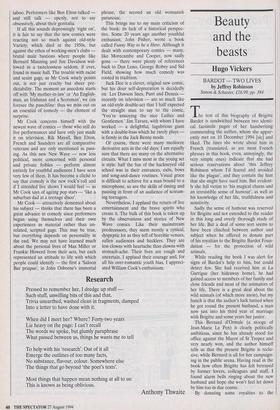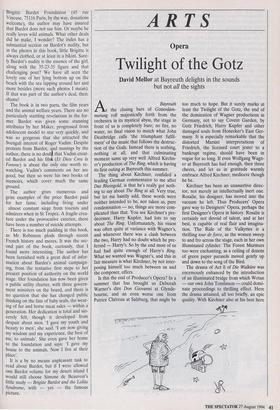Beauty and the beasts
Hugo Vickers
BARDOT — TWO LIVES by Jeffrey Robinson Simon & Schuster, £16.99, pp. 384
he text of this biography of Brigitte Bardot is sandwiched between two identi- cal facsimile pages of her handwriting commending the author, whom she appar- ently met on 10 December 1994 [sic] and liked. The lines she wrote about him in French (translated, as are most French phrases in this book, even, annoyingly, the very simple ones) indicate that she had serious reservations about 'this Jeffrey Robinson whom I'd feared and avoided like the plague', and they contain the hint that she might have sued him. But evident- ly she fell victim to 'his magical charm and an irresistible sense of humour', as well as his knowledge of her life, truthfulness and sensitivity.
Sadly the sense of humour was reserved for Brigitte and not extended to the reader in this long and overly thorough study of her life. But a deal of some sort seems to have been clinched between author and subject when he offered to donate part of his royalties to the Brigitte Bardot Foun- dation — for the protection of wild animals.
While reading the book I was alert for signs of Bardot's help to him, but could detect few. She had received him at La Garrigue (her hideaway home), he had gained access to members of her family and close friends and most of the animators of her life. There is a great deal about the wild animals (of which more anon), but my hunch is that the author's luck turned when he got round the present husband, a man now just into his third year of marriage with Brigitte and some years her junior.
This Bernard d'Ormale (a stooge of Jean-Marie Le Pen) is clearly politically ambitious, since he has already stood for office against the Mayor of St Tropez and very nearly won, and the author himself tells us that the present Brigitte is reclu- sive, while Bernard is all for her campaign- ing in the public arena. Having read in the book how often Brigitte has felt betrayed by former lovers, colleagues and staff, I found alarm bells ringing about the new husband and hope she won't feel let down by him too in due course.
By donating some royalties to the Brigitte Bardot Foundation (45 rue Vineuse, 75116 Paris, by the way, donations welcome), the author may have insured that Bardot does not sue him. Or maybe he really loves wild animals. What other deals did he make, I wonder? The index has a substantial section on Bardot's nudity, but in the photos in this book, little Brigitte is always clothed, or at least in a bikini. Sure- ly Bardot's nudity is the essence of the girl, along with the 35-23-35 figure and that challenging pout? We have all seen the lovely one of her lying bottom up on the beach with the sea lapping around her and more besides (more such photos I mean). If that was part of the author's deal, then: shame!
The book is in two parts, the film years and the animal welfare years. There are no particularly startling revelations in the for- mer. Bardot was given some stunning attributes by her Maker, progressed from adolescent model to star very quickly, and was so gorgeous that she attracted the Svengali interest of Roger Vadim. Despite protests from Bardot, ;rid musings by the author, there is no doubt that Vadim creat- ed Bardot and his film (Et Dieu Crea la Femme) is about the only one worth re- watching. Vadim's comments on her are good, but then so were his two books of memoirs, which cover much the same ground.
The author gives numerous and grim examples of the price Bardot paid for her fame, including living under almost constant siege from tourists and admirers when in St Tropez. A fragile crea- ture under the provocative exterior, there have been a number of suicide attempts.
There is too much padding in this book, as Mr Robinson plods through recent French history and mores. It was the sec- ond part of the book, curiously, that I found more interesting. The author has been furnished with a great deal of infor- mation about Bardot's animal campaign- ing, from the tentative first steps to her present position of authority on the world stage. Her foundation has now been given a public utility charter, with three govern- ment ministers on the board, and there is no question that she has changed public thinking on the fate of baby seals, the wear- ing of fur and horse meat sales — within a generation. Her dedication is total and sin- cerely felt, though it developed from despair about men. 'I gave my youth and beauty to men', she said. 'I am now giving my wisdom and my experience, the best of me, to animals'. She even gave her home to the foundation and says: 'I gave my house to the animals. Now I live at their place'.
It is a by no means unpleasant task to read about Bardot, but if I were allowed one Bardot volume for my desert island I would still choose Simone de Beauvoir's little study — Brigitte Bardot and the Lolita Syndrome, with — yes — the famous picture.



























































 Previous page
Previous page